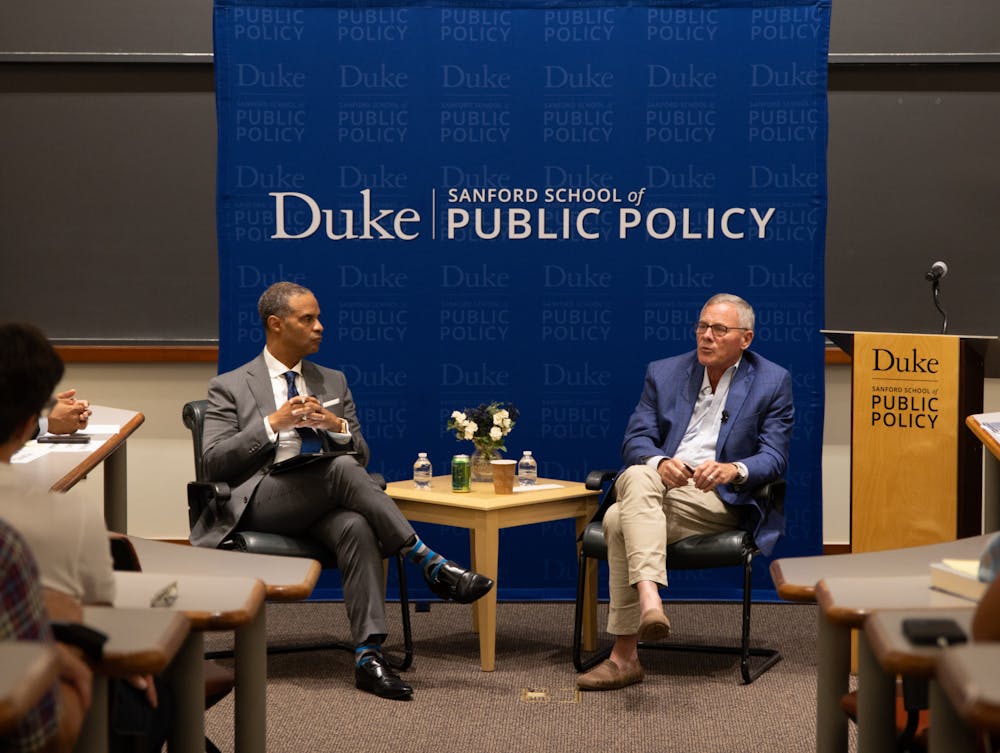Former U.S. Sen. Richard Burr, R-N.C., spoke of the importance of U.S. representatives bridging partisan divides to enact meaningful legislation during a Monday event at Duke.
The conversation, titled “Bridging the Divide: A Fireside Chat,” was moderated by Provost Alec Gallimore and hosted by the Office of the Provost, the Sanford School of Public Policy and POLIS: Center for Politics.
Burr was first elected to Congress in 1994, serving 10 years in the House of Representatives before his tenure as a U.S. senator from 2005 to 2023. He served as chair of the Senate Intelligence Committee from 2015 to 2020.
In August, Burr joined the faculty of the Sanford School of Public Policy as a POLIS Distinguished Fellow.
Lessons in bipartisanship
Two months into Burr’s tenure as a U.S. representative, he received formative advice which helped him understand the nature of bipartisanship.
“Spend the first year with your ears and not with your mouth,” Rep. John Dingell, D-Mich., told Burr during a visit to Dingell’s office.
Throughout his tenure, Burr observed that successful bipartisan legislation was achieved when representatives engaged in dialogue with their colleagues to help them understand that the same issue existed among their constituents.
“What you learn is that nothing good happens in a partisan fashion in Washington,” he explained. “... Effectively navigating Washington is understanding who you can work with and how you can work with them to actually get things done.”
Burr listed “leadership and trust” as two qualities a person needs to succeed in a bipartisan effort. Additionally, a successful leader, particularly in Congress, needs to be able to “paint the picture” of their goals.
“Serving in Congress is not just winning an election and finding a partner,” Burr said. He explained that it’s about learning the “reality of legislative initiatives” and taking advantage of available “avenues of education.”
Burr shared that when he was faced with a decision of whether to cut reimbursements for thoracic surgeons, he chose to sit in on a live surgery to observe the surgeon, nurse and anesthesiologist. Imagining himself as the person “on the table” — and wishing for “more people in the room” — gave him a “why” to argue against the legislation in Washington.
“There's just too much talent not to tap into it and to try to educate yourself whether you're right or whether you're wrong,” he said. “If [my staff] came in to propose something to me, they had to show the human face behind it.”
As examples of working across the aisle to pass legislation, Burr cited collaborations with former Sen. Ted Kennedy, D-Mass., on healthcare and former Rep. Henry Waxman, D-Calif., on reforming the Food and Drug Administration.
Burr also shared poignant moments from his congressional tenure. Once, an Air Force F-15 pilot handed Burr a ballot sheet from an Iraqi election. A polling official had handed the ballot to the pilot, asking for it to be delivered to Burr as “the person who is responsible for [him] being able to vote for the first time in [his] life.” To Burr, this constituted an “emotional moment” and a reminder of the importance of participating in elections.
Despite the need for greater election participation, Burr views American democracy as “the best system that exists in the world,” and believes that “everybody else is trying to replicate” it.
Current issues
Burr spoke on various policy issues, including the growth of the national debt. He expressed doubt that the U.S. could “grow its way” out of a debt which he predicts will soon require a $41 trillion ceiling.
“For the first time, the interest on the debt will exceed any other line item in the federal budget,” Burr said. “... We will pay more money in interest on the debt than we will to defend the country.”
Burr also spoke about a future which promises significant change due to technology.
Get The Chronicle straight to your inbox
Sign up for our weekly newsletter. Cancel at any time.
“We're headed into a decade of the most significant transformative change that we will see in our lifetimes, and that's in AI and quantum computing,” he said.
Burr criticized certain federal policymaking for relying on the “historical model,” where legislation builds on an existing system or program rather than starting anew.
“We never take this clean piece of paper and throw the old one away and [ask], ‘if we designed it today, how would it look?’” Burr explained. He cited student loans as an example of an issue held back by the historical model, without which there could be “new ideas” and “more innovation potential.”
The event continued with an audience Q&A, in which one audience member asked about Burr’s endorsement of Republican candidate Donald Trump in the 2024 election.
Burr voted to convict Donald Trump during the former president’s 2021 impeachment trial. He described the decision as “nothing to do with the three charges the House brought,” but rather a response to the fact that “that there should have been a detail that immediately came to Capitol Hill to secure the vice president” on Jan. 6, 2021.
He called the endorsement a “policy decision” more than “a personality decision.”
Advice for students
“It’s all about leadership,” Burr told students at the event. “... If you ask me, what would you emphasize that universities need to start doing, it's not just educating the students — it’s creating leadership.”
Burr encouraged young people to prioritize “what’s best for the country” rather than always seeking to meet personal goals. He also emphasized the importance of staying informed and researching political candidates.
“Remember what your mother taught you: you have a right to an opinion, but you don’t have a right to be rude,” Burr said. “If you want people to work with you, you have to be likable.”
Samanyu Gangappa is a Trinity sophomore and local/national news editor for the news department.

